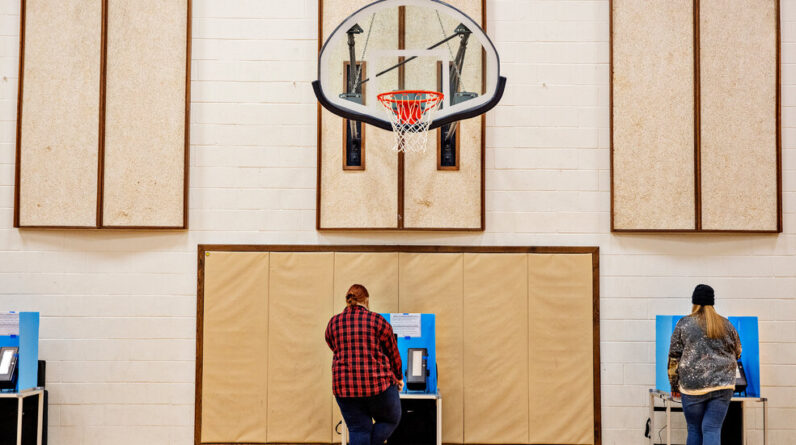
Utah Supreme Court justices appeared skeptical Tuesday of arguments made by the state Legislature that it had essentially unreviewable power to draw a map of the state’s congressional districts that diluted Democratic votes.
The legislature controlled by Republicans approved a map in 2021, it split Democratic-leaning Salt Lake County, the state’s most populous county, and scattered its voters among the state’s four U.S. House districts, all of which are predominantly Republican.
Lawmakers acted after repealing a law — enacted by Utah voters in a 2018 ballot initiative — that banned political maps that improperly favored a candidate or political party, known as gerrymanders.
The Legislature’s map was widely recognized at the time as a partisan gerrymander, including by the Republican governor, Spencer J. Cox, who noted at the time that both parties often produced biased maps.
The question before the courts Tuesday was whether state courts could hear a lawsuit challenging the Legislature’s map, or whether partisan maps were a political issue outside their jurisdiction. It was unclear when the court will issue a ruling.
The US Supreme Court considered the same issue in 2019 and ruled that the maps were beyond its reach. But voting rights advocates say the Utah Constitution makes a stronger case than the federal one for curbing political maps.
Much of Tuesday’s hearing, which was televised on the state court website — has focused on the repeal by the Legislature of the 2018 electoral initiative, given that the State Constitution provides that all political power resides in the people and that they have the right to “alter and reform” their government
“The Legislature has engaged for decades in this undemocratic distortion of the process,” said Mark Gaber, an attorney with the Campaign Legal Center, a Washington-based law firm representing the plaintiffs in the court case. “And the people said, ‘We’ve had enough. We’re going to disrupt and reform our government and recognize that we have the political power in this state.'”
Taylor Meehan, an attorney with the Consovoy McCarthy law firm representing the Legislature, said Utah citizens had many ways to exert political influence even after the repeal. “People can advocate for a constitutional amendment,” said Ms. Meehan. “The people can also choose and pressure and propose ideas to their Legislature. The Legislature will still be politically responsible for whether they vote maps up or down.”
Chief Justice Matthew Durrant disputed the claim. “That seems like an empty promise,” he said. “Ultimately, under the system you suggest, the Legislature will always have the last word.”
State Sen. Scott D. Sandall, the Republican co-chair of the legislative redistricting committee that drew the U.S. House map, did not respond to requests for comment.
In court filings, lawmakers said the state Constitution gave them exclusive authority to draw political maps and that the plaintiffs were trying to impose “illusory standards of political equality” on the map-making process.
The Utah case could have national implications, not only for the political balance of the closely divided U.S. House, but also for the emerging body of legal precedent that influences how courts rule in other states
Because the U.S. Supreme Court has barred federal courts from deciding partisan gerrymander cases, state courts are becoming a crucial battleground for opponents of biased maps. Joshua A. Douglas, an expert on state constitutional voting protections at the University of Kentucky, said the growing body of legal precedent in state gerrymandering cases was important because many state constitutions shared similar protections for elections and voters , often derived from each other.
Courts in Pennsylvania, Maryland, Alaska, New York and, last week, New Mexico have ruled that partisan gerrymanders can be unconstitutional. They also have courts in Ohio and North Carolina. However, the Ohio court proved unable to compel the legislature to comply with its rulings, and the North Carolina decision was overturned in April after elections changed the court’s majority from Democrat to Republican.
The Supreme Court of Kentucky will hear a challenge on that state’s legislative and congressional maps in September. And a lawsuit against an extreme Republican gerrymander in the Wisconsin Legislature is widely expected after April’s election gave liberals a majority on the state’s highest court.
Perhaps the closest analogy to Utah’s gerrymander is in Nashville, where the latest congressional map of the Republican-led state legislature split the city’s former Democratic-majority U.S. House district among three districts strongly republican. Democrats have not challenged the map in state courts, presumably because they see little chance of winning in a state Supreme Court dominated by Republican appointees.
In Utah’s case, however, the five state Supreme Court justices are not known for bending easily to the political winds. They are chosen through a merit-based selection process.
The Utah Plaintiffs – the state chapter of the League of Women Voters, the advocacy group Mormon Women for Ethical Governmentand a handful of Utah voters –
say the gerrymandered map ignores a number of state constitutional provisions, including guarantees of free speech, free association and equal protection, provisions they say should be read as prohibiting partisan maps.
Republican lawmakers contain that they had the right to repeal the 2018 redistricting law, just as they could any other state law. And they say the plaintiffs’ goal is not unlike theirs: to tilt the playing field in their favor.
But Katie Wright, the chief executive of Better Limits — the group that led the effort to pass the redistricting law and is backing the lawsuit — argued that there was a difference between the two. He noted that the Utah Legislature’s release of its new maps in 2021 sparked an unusually large public outcry that continues even today.
“The reason we have these maps is to keep the people in power in power,” he said. “The Utahns haven’t given up.”
[ad_2]
Source link





